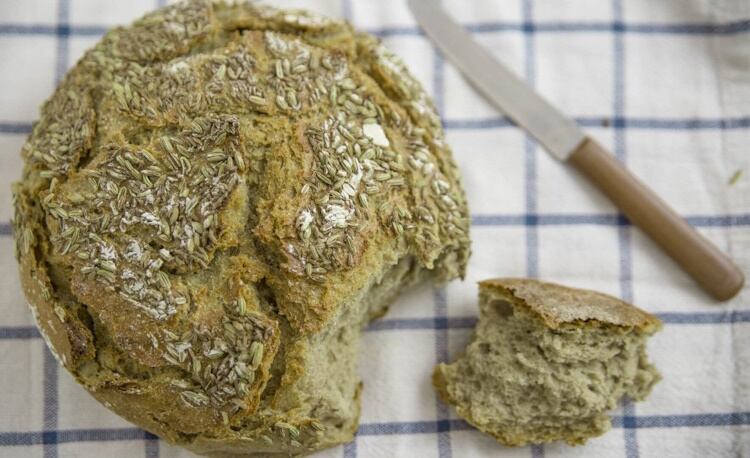It’s high in fibre, low in environmental impact and now, it seems, right at home in the bakery aisle. A UK trial has found that seaweed could quietly reshape how we bake healthier bread and muffins, without compromising taste or process.
As public health bodies push for higher fibre intake and reduced levels of fat, salt and sugar in everyday foods, food manufacturers are under mounting pressure to reformulate. But doing so without disrupting taste, texture or production is a tough balancing act.
That’s why researchers and bakery developers set out to test whether a regenerative seaweed-derived ingredient could do the job: adding nutrition while keeping quality and efficiency firmly intact.
The trial, part of Innovate UK’s Better Food for All programme, centred on Seafibrex, a novel fibre ingredient created by Scottish biotech firm BioMara. Working alongside local ingredient specialist Macphie and Abertay University, the team assessed how the ingredient performed in everyday bakery products – muffins, bread rolls, sandwich loaves – using standard commercial processes.
“We set out to improve everyday foods without asking people to give anything up,” said Jay Dignan, CEO of BioMara. “If we’re serious about improving the UK’s diet, we need to do it through foods people are already eating.”
A clean fit for commercial baking

Industrial trials were designed to replicate real bakery conditions. The fibre was incorporated into existing formulations without altering mixing, proofing or baking steps. For bakers working under strict cost and time pressures, that kind of plug-and-play functionality is crucial.
“One of the key outcomes was proving Seafibrex didn’t need special treatment,” said Dignan. “No changes to machinery, no extra stages – it simply worked inside the current system. That’s what makes it scalable.”
Unlike many traditional fibre additives, which can dry out doughs or give a grainy mouthfeel, the seaweed-based fibre retained moisture and produced a softer crumb structure. In fact, sensory trials showed that consumer panels preferred the reformulated products to their control counterparts in terms of taste, texture and overall enjoyment.
“We expected it to match the original formulations,” said Dignan. “What we didn’t expect was that people would actually prefer the versions with added fibre. That’s a big win.”
Aberdeenshire-based Macphie – which led the industrial-scale trials – also confirmed the ingredient’s technical and sensory performance aligned with evolving customer demand.
“This is a timely and valuable initiative aimed at improving the nation’s health without asking people to give up the foods they love,” said R&D manager Paul McKnight. “The programme has shown that seaweed-based ingredients like Seafibrex can be incorporated into our product lines without sacrificing taste or quality. We’re also seeing growing demand from our customers for innovative functional ingredient solutions from reliable local suppliers that align with wellness and sustainability trends.”
Reformulation without the usual trade-offs

One of the most significant findings from the trial was that Seafibrex supported multiple reformulation goals. It delivered enough dietary fibre to enable ‘source of’ or ‘high in fibre’ claims, while also allowing reductions in added salt, sugar and fat – without requiring bulking agents or stabilisers to make up the difference.
Its naturally occurring minerals and gentle umami notes supported sodium reduction in savoury applications, while its water-binding properties helped retain moistness in lower-fat baked goods. And because it performed well in standard bakery formats, it made clean label improvements possible without affecting consumer experience.
“This is health by stealth,” said Dignan. “Consumers still want indulgent bakery products. This allows brands to deliver those experiences with better nutrition without a long list of unfamiliar ingredients.”
The fibre also contributed trace levels of micronutrients like iodine and calcium, offering added-value nutritional benefits in a category where those claims are rare.
Why seaweed’s having a bakery moment
Step aside, oats - seaweed might just be the most underrated ingredient in the future of functional baking. Here’s why it’s gaining ground fast:
Seaweed is on track to become a $25 billion global market by 2028 (Allied Market Research), driven by demand for sustainable, nutrient-rich ingredients. Yet in the UK, only 2% of consumers regularly eat it: though awareness is climbing rapidly, especially among wellness-focused shoppers (Mintel).
In Scotland, a thriving blue economy is emerging, with over 10 commercial seaweed farms supporting coastal communities and shortening supply chains. Environmentally, seaweed is hard to beat: it captures up to 20x more CO₂ per acre than land crops and grows without fertiliser, freshwater or farmland.
And in the bakery? Seaweed blends have been shown to cut sodium by nearly 30% in bread trials without sacrificing taste or moisture. Certain varieties also extend shelf life and enhance umami, making them functional beyond fibre or flavour.
In short, it’s nutritious, it’s sustainable and yes, it just might make your muffin healthier, softer and salt-smart.
What about the seaweed stigma?

While seaweed has long been a staple in Asian cuisines and is gaining traction in snacks, it still faces perception barriers in traditional Western formats like baked goods. But the trial helped challenge the idea that seaweed equals ‘fishy’.
“The first thing we had to prove is that it doesn’t taste like the ocean,” said Dignan. “At the inclusion rates used in baking, the flavour is neutral or slightly savoury. It doesn’t overpower anything. It just supports the profile that’s already there.”
That sensory neutrality gives food developers options. Brands targeting mainstream audiences can lean into fibre and gut health claims without drawing attention to the marine origin. More sustainability-conscious or ingredient-savvy shoppers may respond to the story behind the seaweed – particularly when it’s locally and regeneratively sourced.
“You don’t need to lead with the word ‘seaweed’,” said Dignan. “You can let the benefits do the talking and decide how much of the story to share, depending on your customer base.”
A timely ingredient for a system under strain

Pressures are mounting for bakers: HFSS regulations are tightening, fibre targets are being raised and consumer demand for clean label, plant-based products shows no signs of slowing. Yet few ingredients can meet those expectations without creating cost, complexity or compromise.
That’s where this trial stands out. By demonstrating that a seaweed-derived fibre can function seamlessly in everyday bakery applications while delivering multiple reformulation benefits, it offers an unusually practical solution.
“We’re not chasing a niche here,” said Dignan. “We’re solving problems that every bakery brand faces – how to make their products healthier, cleaner and more future-proof without wrecking taste or profitability.”
He also points to broader benefits beyond the bakery. Seaweed farming requires no fertiliser, no freshwater and no arable land. It absorbs carbon and nitrogen, contributing to ocean health and climate resilience. And with a growing network of Scottish seaweed farms, supply chains can be local and transparent.
“This isn’t just about nutrition,” said Dignan. “It’s about building ingredients for the food system we need next. One that works for people, businesses and the planet.”
Scaling up

With proof-of-concept confirmed and production scaling up, the partners are moving into commercialisation. Macphie is exploring further applications across bakery and beyond, including gluten-free lines and reduced-calorie formats.
Discussions with manufacturers are underway, with interest coming from both private label retailers and branded bakery producers looking to strengthen their better-for-you portfolios.
“The innovation is there. The appetite is there. Now it’s about execution,” said Dignan. “This trial shows what’s possible when we stop thinking of seaweed as exotic and start treating it like a modern ingredient with serious potential.”


